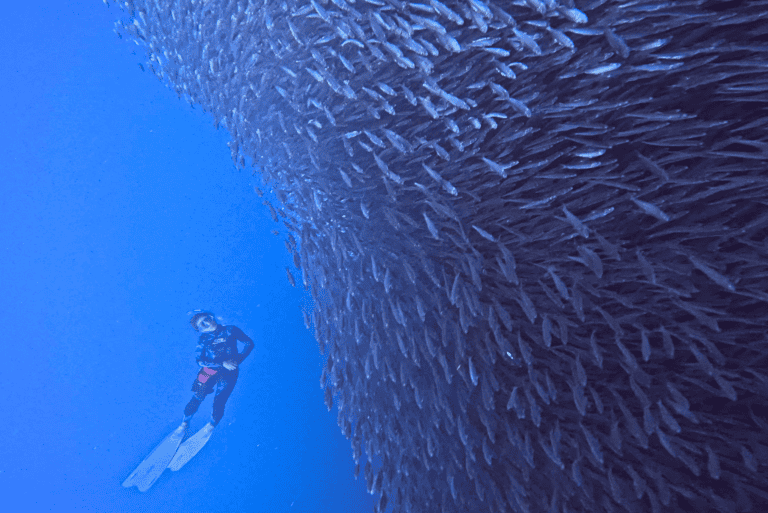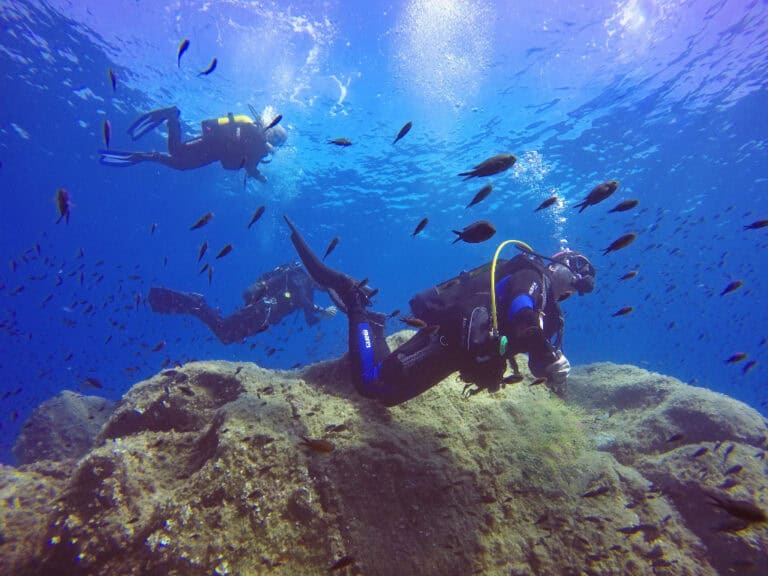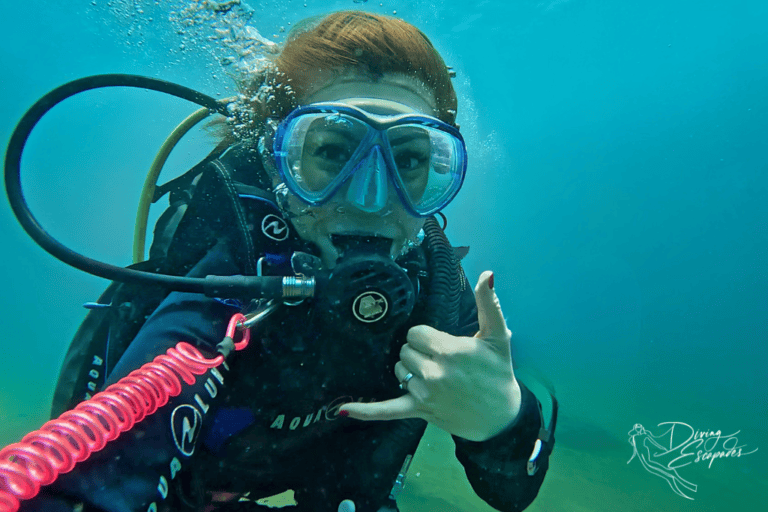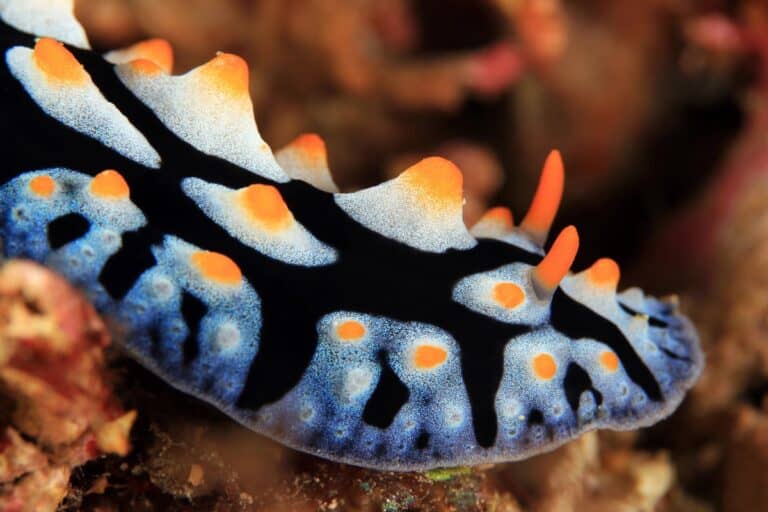What Does SCUBA stand for? Quick Guide for Beginners
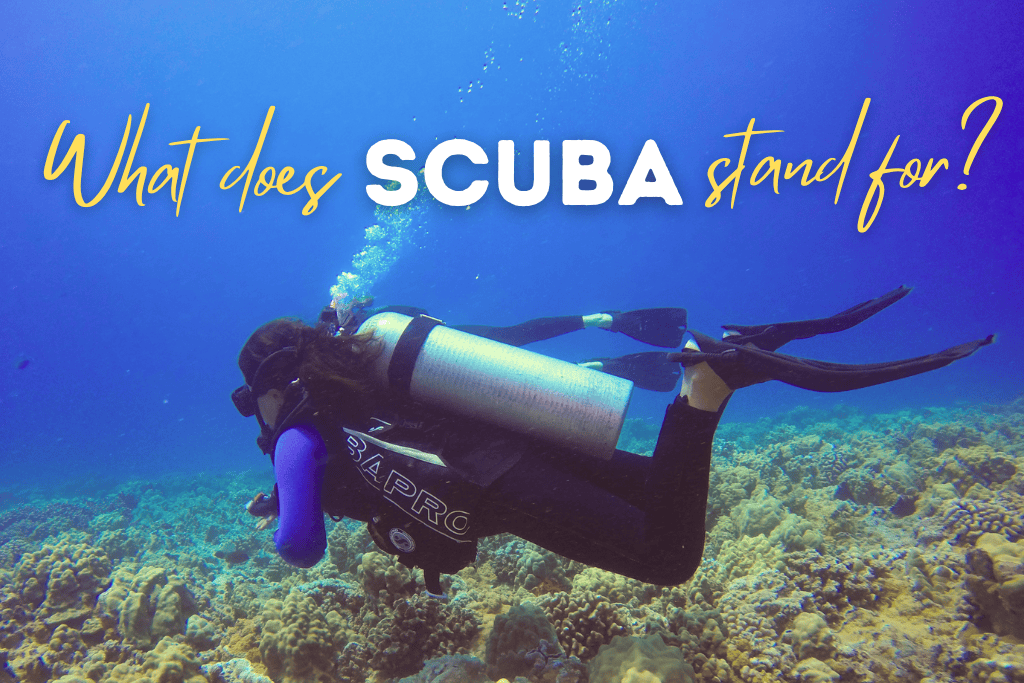
Wondering what SCUBA stands for?
Hearing the word “SCUBA” might make you think of exploring coral reefs, swimming with sea turtles, and the thrill of underwater adventure. But what does SCUBA actually stand for?
Well, if you’ve ever dreamed of exploring underwater, you’re in the right place. As someone who’s fallen in love with diving, I’m excited to share what SCUBA means, its fascinating history and why this amazing activity is so special.
What Does SCUBA Stand For and What Is Its Purpose?
SCUBA stands for Self-Contained Underwater Breathing Apparatus. The purpose of SCUBA gear is to enable us to breathe underwater, giving us the freedom to explore the aquatic world. The acronym SCUBA breaks down into:
- Self-Contained: The equipment you carry with you, like a tank and regulator.
- Underwater: The environment you’re diving in.
- Breathing Apparatus: The system that allows you to breathe while submerged.
When I first started diving in 2013, the idea of breathing underwater completely fascinated me. The thought of swimming alongside turtles and exploring shipwrecks felt like something out of a dream.
However, once I got my hands on the gear and learned how it worked, I discovered the true beauty and complexity of SCUBA diving. I must admit, I quickly became addicted to it. It’s like discovering a new favorite hobby, only this one involves less couch time and more fish.
Who Coined the Term SCUBA?
SCUBA was coined by Dr. Christian J. Lambertsen in the early 1940s. Dr. Lambertsen, an American physician and inventor, developed the first SCUBA system for the U.S. military during World War II.
Initially, the term was used for rebreathers that were used by underwater warfare units. Today, SCUBA is a general term for any equipment that allows you to breathe underwater independently.
Why Is SCUBA Diving So Special?
SCUBA diving is special for many reasons. First and foremost, it opens up a whole new world. The ocean covers over 70% of our planet, yet much of it remains unexplored. When you dive, you become part of that mysterious world, even if just for a short while.
One of my most memorable dives was off the coast of Byron Bay, New South Wales, Australia, at a dive site called Julian Rocks. As I descended, I was greeted by a group of leopard sharks, as if they were the welcoming committee.
Surrounded by colorful corals, wobbegong sharks and grey nurse sharks, it felt like I had entered an underwater carnival. Moments like these make SCUBA diving truly special.
Another reason SCUBA diving stands out is the sense of freedom it provides. Underwater, the weightlessness is incredibly liberating.
You can glide effortlessly, turning and spinning in ways that aren’t possible on land. It’s a feeling that’s hard to describe but incredibly easy to fall in love with.
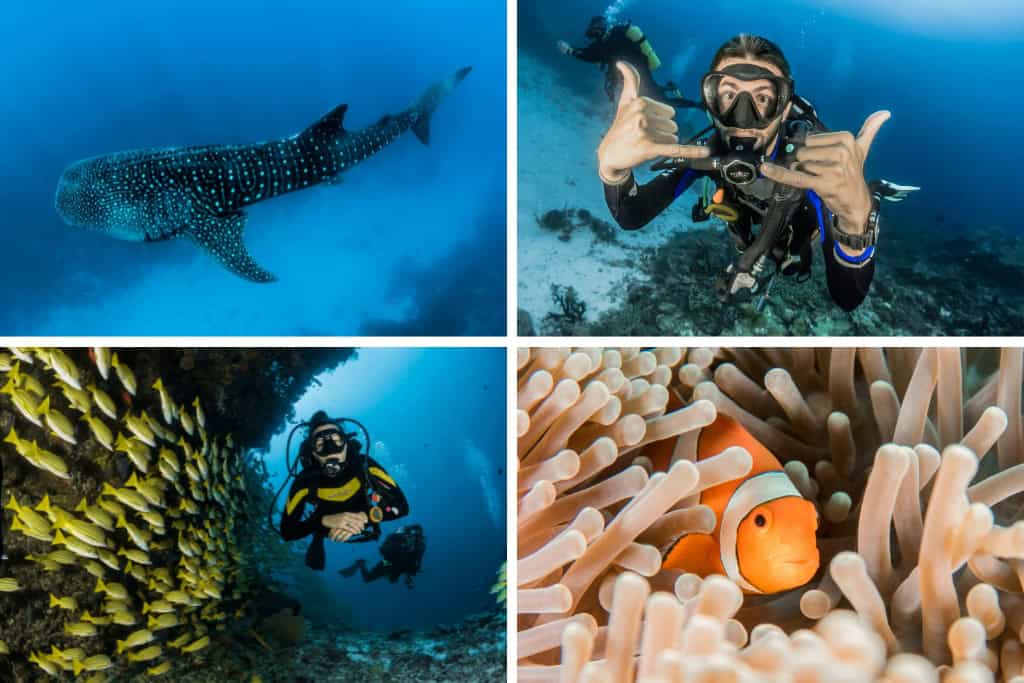
Underwater Photos by Sebastian Pena Lambarri on Unsplash
Who Invented SCUBA Technology?
The development of SCUBA technology is a fascinating story of innovation and determination.
While Dr. Christian J. Lambertsen coined the term SCUBA, the actual gear we use today owes much to pioneers like Jacques Yves Cousteau and Emile Gagnan.
In the 1940s, Cousteau and Gagnan developed the Aqua-Lung, the first open-circuit SCUBA system that allowed divers to breathe underwater for extended periods. This invention was a game-changer.
Before the Aqua-Lung, divers relied on surface-supplied air, which significantly limited their mobility and range.
The Aqua-Lung revolutionized underwater exploration, making SCUBA diving accessible to the public and paving the way for the modern SCUBA diving gear we use today.
How Has SCUBA Diving Evolved Today?
Today, SCUBA diving has come a long way from its early days. Modern equipment is safer, more efficient, and more comfortable than ever before.
Advances in technology have made diving more accessible to people of all ages and backgrounds.
One of the biggest changes has been in the design of dive computers. These handy devices track your depth, time, and decompression limits, ensuring you stay within safe limits during your dive.
I remember my first dive computer – it was a clunky, wrist-mounted device that looked like something out of a sci-fi movie. Nowadays, dive computers are sleek, compact, and packed with features.
Another significant advancement is in the materials used for dive gear. Today’s wetsuits, for example, are made from high-tech materials like neoprene with enhanced stretch properties and thermal linings that provide better insulation and flexibility.
This means you can stay warm and comfortable even in colder waters. Additionally, some modern dive gear incorporates recycled materials, such as neoprene made from recycled tires and eco-friendly fabrics.
These sustainable options not only reduce environmental impact but also offer excellent durability and performance, ensuring you can enjoy your dives while being kind to the planet.
What Are the Benefits of SCUBA Diving?
SCUBA diving offers numerous benefits beyond the thrill of underwater exploration. Here are a few:
Physical Health
Diving is a great way to stay active. Swimming against the water’s resistance provides a full-body workout, helping to improve strength, flexibility, and cardiovascular health.
Mental Health
The underwater world is incredibly peaceful. The gentle sound of your breath and the rhythmic movement of the water can be very calming, making diving a great way to relieve stress and anxiety.
Adventure
Every dive is an adventure. Whether you’re exploring a coral reef, a shipwreck, or a cave, there’s always something new to discover.
Environmental Awareness
Diving gives you a firsthand look at the beauty and fragility of marine ecosystems. Many divers become passionate advocates for ocean conservation after witnessing the impacts of pollution and climate change.
Personally, since I started diving, I’ve become much more aware of my consumption habits, especially regarding plastic usage and recycling. The ocean’s vulnerability has made me pay closer attention to sustainability and the importance of circularity in our everyday lives.
Moreover, one of my favorite benefits of diving is the sense of community it brings. Divers are a tight-knit group, and I’ve made some incredible friends through diving. Sharing stories and experiences with fellow divers is always a highlight of any dive trip.
How Do You Get Certified in SCUBA Diving?
Getting certified to dive is an essential step to ensure your safety and enjoyment underwater. The certification process involves training, both in the classroom and in the water. Here’s how you can get started:
1. Choose a Certification Agency
There are several reputable agencies, such as PADI, SSI, CMAS. Each offers comprehensive training programs recognized worldwide.
2. Complete the Knowledge Development
This includes studying diving theory, learning about equipment, and understanding safety protocols. This can be done through online courses or in a classroom setting.
3. Confined Water Dives
These practice sessions are conducted in a pool or shallow water. Here, you’ll learn and practice essential diving skills.
4. Open Water Dives
These dives take place in open water, such as a lake or ocean. You’ll apply what you’ve learned in a real-world setting under the supervision of an instructor.
5. Certification
After completing the required number of open water dives and demonstrating your skills, you’ll receive your certification. This allows you to rent equipment and dive independently.
When I first got certified, I was both excited and nervous. Excited because I knew this opened up a whole new way of traveling – I could explore underwater as well as above water.
Nervous because I realized traveling might get a bit more expensive (just kidding, sort of).
However, the moment I descended and saw the ocean depths for the first time, I was hooked. It was an unforgettable experience that marked the beginning of my passion for diving.
What Are Common SCUBA Diving Myths and Facts?
There are many myths about SCUBA diving that can deter potential divers. Let’s debunk some of the most common ones:
Myth: SCUBA diving is dangerous.
Fact: While there are risks, proper training and following safety protocols make SCUBA diving very safe. Most diving incidents occur due to human error, not equipment failure.
Myth: You need to be a strong swimmer to dive.
Fact: While being comfortable in the water is important, you don’t need to be an Olympic swimmer. Basic swimming skills are sufficient, and the training will help you build confidence.
Myth: Diving is too expensive.
Fact: While initial certification and equipment costs can add up, many dive shops offer affordable gear rental options. Once certified, you can dive in many places around the world without breaking the bank.
Myth: Sharks are a constant threat.
Fact: Shark attacks on divers are extremely rare. Most sharks are not interested in humans and will avoid divers. Seeing a shark while diving is actually a highlight for many divers.
One of my first dives involved a close encounter with a grey nurse shark in North Stradbroke Island in Queenland, Australia. I remember feeling a mix of excitement and nervousness as it swam by.
The shark was more interested in the fish around the reef than in me. It was a beautiful and humbling experience, showing how these creatures are an essential part of the marine ecosystem.
Sustainable Diving: Why It’s Important
As divers, we have a responsibility to protect the underwater world we love so much. Sustainable diving practices are essential to preserving marine ecosystems for future generations.
This includes following guidelines like not touching or disturbing marine life, avoiding contact with coral, and properly disposing of waste.
If you’re interested in learning more about how to dive sustainably, I highly recommend reading my article titled “Sustainable Diving: Why It’s The Ultimate Path Forward”.
It’s packed with tips and information on how to minimize your impact while enjoying the wonders of the ocean.

The Wrap Up: Understanding What SCUBA Stands For
Understanding what SCUBA stands for is just the beginning of your diving journey. SCUBA diving offers a unique blend of adventure, serenity, and exploration that is hard to find elsewhere.
Whether you’re drawn to colorful coral reefs, shipwrecks, or the thrill of deep-sea diving, there’s something for everyone underwater.
I’ve been fortunate to dive in some incredible places and meet amazing people along the way. Each dive is a new adventure, filled with surprises and wonders.
The sense of peace and freedom I feel underwater is unmatched, and it’s a big part of why I love diving so much.
So, if you’re considering taking the plunge, I wholeheartedly encourage you to dive in—literally. Get certified, explore new destinations, and immerse yourself in the beauty beneath the waves.
Once you experience the magic of SCUBA diving, you’ll understand why it’s more addictive than binge-watching your favorite TV series 😉

